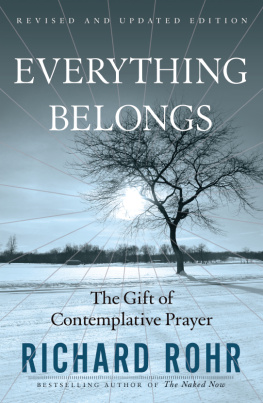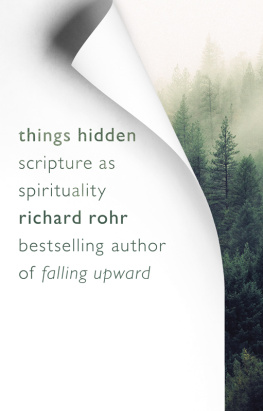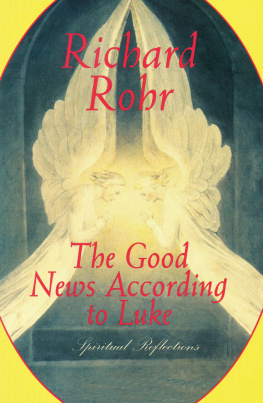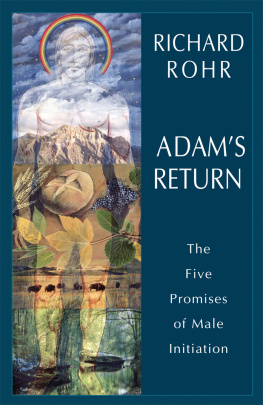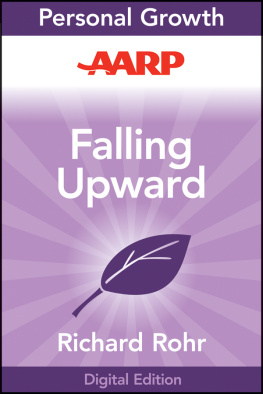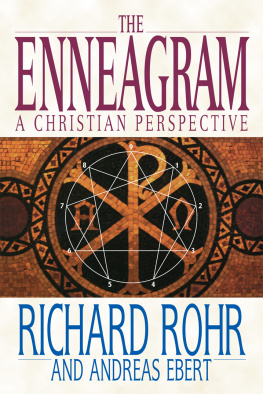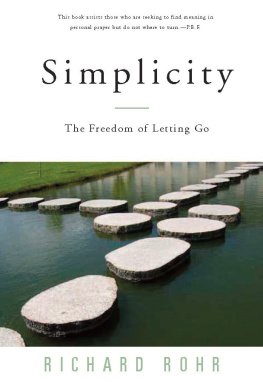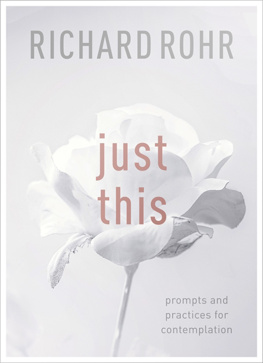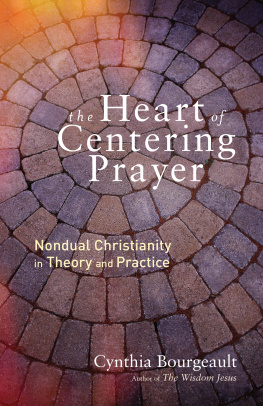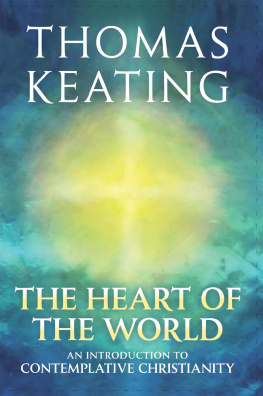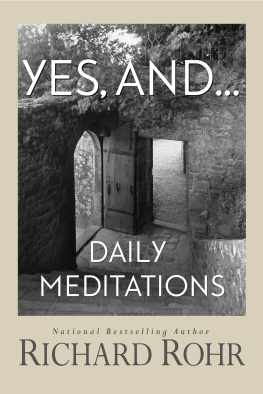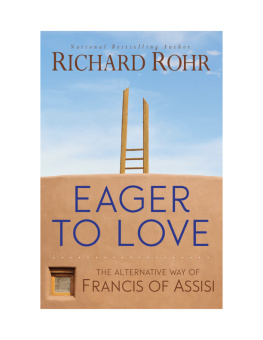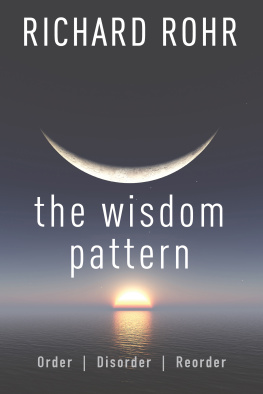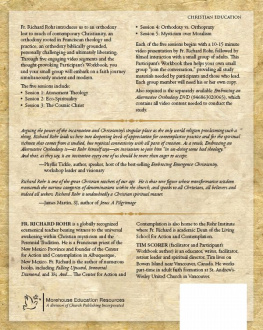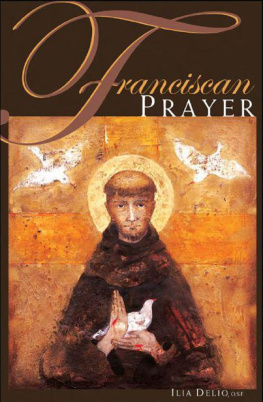Praise for
Everything Belongs
Rohr at his finest: insightful cultural critique woven with strong connection to both the marginalized and the contemplative. This small book brings prayer and solitude together with the wounds of the world in insightful synthesis. The Other Side
Rohr gets to the heart of Christianity and what it means to be contemplative. It is the sort of book one could recommend (or give) to someone who is searching for something more. Monos
Simply written yet deeply challenging. At the base of all reality, Rohr writes, is Gods radical grace.
The Mennonite
Rohr steers the reader toward a deeper prayer life. With the novice in mind, Rohr helps the reader know what contemplation is all about and how one is to get out of the way in the quest. St. Anthony Messenger
The challenge of this book is simple, yet profound: Be aware. Be aware of God in all things.
Catholic Library World
Genuine mystics, according to Rohr, do not experience a God who compares, differentiates, and judges. Instead, they experience the embrace of a lover. A truly helpful book, one to be read and reread. Spirit and Life
Once again we have a gift from Richard Rohr, certainly one of the most significant prophets to the contemporary church. With words eloquent, words from the heart, words that live in and emerge from healthy spirituality, this book is a grand invitation to grow. Perhaps the rarest gift in this book is that we will get a good and needed shaking up. Resources Hotline
Rohr draws on his experience as a spiritual guide and retreat-giver, as well as on his own experience of prayer; and his reassuring wisdom will confirm and authenticate that of many readers. Church Times
This book is about learning to see, to see anew, to acknowledge oneself as a beginner, thus being open to transformation. Rohr has written gems of thought worth pondering again and again. This book can be read and studied individually or used as a resource for a group. Bookfinder
Everything
Belongs
The Gift of
Contemplative Prayer
REVISED AND UPDATED
EDITION
Richard Rohr

A Crossroad Book
The Crossroad Publishing Company
New York
The Crossroad Publishing Company
www.crossroadpublishing.com
Copyright 1999, 2003 by Richard Rohr
Guide for Reection copyright 2003 by The Crossroad Publishing Company
Crossroad, Herder & Herder, and the crossed C logo/colophon are trademarks of The Crossroad Publishing Company.
All rights reserved. No part of this book may be copied, scanned, reproduced in any way, or stored in a retrieval system, or transmitted, in any form or by any means, electronic, mechanical, photocopying, recording, or otherwise, without the written permission of The Crossroad Publishing Company. For permission please write to .
In continuation of our 200-year tradition of independent publishing, The Crossroad Publishing Company proudly offers a variety of books with strong, original voices and diverse perspectives. The viewpoints expressed in our books are not necessarily those of The Crossroad Publishing Company, any of its imprints, or of its employees. No claims are made or responsibility assumed for any health or other benefits.
Library of Congress Cataloging-in-Publication Data available from the Library of Congress.
ISBN: 9780824525439
EPUB ISBN: 9780824520885
MOBI ISBN: 9780824520892
Books published by The Crossroad Publishing Company may be purchased at special quantity discount rates for classes and institutional use. For information, please email .
Printed in the United States of America
I want not only to thank
but to dedicate this book to
Clink Thomson.
His years of friendship, advice,
support, and endless patience
have sent my taped words all over the world.
Now he is foolish enough to do
what they say never to do:
put it down in writing.
With his humor and my seriousness,
we make a tolerable team.
One always learns ones mystery
at the price of ones innocence.
Pulling out the chair
Beneath your mind
And watching you fall upon God
There is nothing else for Hafiz to do
That is any fun in this world!
Shams-ud-din Mohammed Hafiz,
Muslim mystic (132089)
Contents
Inherent Unmarketability
How do you make attractive that which is not?
How do you sell emptiness, vulnerability, and nonsuccess?
How do you talk descent when everything is about ascent?
How can you possibly market letting-go in a capitalist culture?
How do you present Jesus to a Promethean mind?
How do you talk about dying to a church trying to appear perfect?
This is not going to work
(admitting this might be my first step).
one
Center and
Circumference
Turning and turning in the widening gyre
The falcon cannot hear the falconer;
Things fall apart; the center cannot hold;
Mere anarchy is loosed upon the world,
The blood-dimmed tide is loosed, and everywhere
The ceremony of innocence is drowned;
The best lack all conviction, while the worst
Are full of passionate intensity.
William Butler Yeats, The Second Coming
We are a circumference people, with little access to the center. We live on the boundaries of our own lives in the widening gyre, confusing edges with essence, too quickly claiming the superficial as substance. As Yeats predicted, things have fallen apart and the center does not seem to be holding.
If the circumferences of our lives were evil, it would be easier to moralize about them. But boundaries and edges are not bad as much as they are passing, accidental, sometimes illusory, and too often in need of defense or decoration. Our skin is not bad; its just not our soul or spirit. But skin might also be the only available beginning point for many contemporary people. Earlier peoples, who didnt have as many escapes and means to avoid reality, had to find Essence earlier just to survive. On the contrary, we can remain on the circumferences of our lives for quite a long time. So long, that it starts feeling like the only life available.
Not many people are telling us there is anything more to life. I am told that the primary mediating institutions in our deconstructed society are the media and the business world. While these institutions are not bad, they are inadequate to name our soul or entice our spirit. We are at a serious disadvantage if we take them as the bottom line of our existence, which is ironically exactly what we call the business or economic perspective.
Lets presume that there was an earlier age when people had easy and natural access to their souls and openness to transcendent Spirit. I am not sure that this age ever perfectly existed, any more than the Garden of Eden, where all was naked and in harmony, but if it did, it consisted of people who were either loved very well at their center or who suffered very much around the edges probably both. The path of prayer and love and the path of suffering seem to be the two Great Paths of transformation. Suffering seems to get our attention; love and prayer seem to get our heart and our passion.
But most of us return to the garden by a more arduous route. In his poem Four quartets, T. S. Eliot called it the path of observance, discipline, thought and action. The hint half guessed, the gift half understood. This ordinary path

